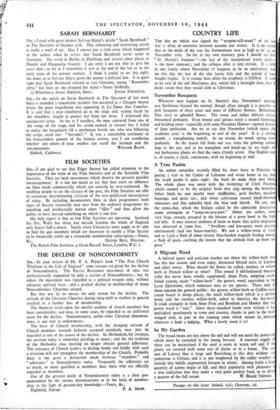THE DECLINE OF NONCONFORMITY
SIR,—In your review of Mr. E. A. Payne's book "The Free Church Tradition in the Life of England " some reasons are given for the decline of Nonconformity. The Passive Resistance movement of 1902 was enthusiastically supported by only a section of Nonconformists ; but by others the movement was regarded as a political weapon only, without adequate spiritual basis ; and a gradual decline in membership of many Nonconformist Churches ensued.
But that was by no means the only reason for the decline. The attitude of the Christian Churches during 1914-1918 to warfare in general resulted in a further loss of membership.
The financial strain upon the smaller number of church members has been considerable, and may, in some cases, be regarded as an additional cause for the decline. Nonconformity, unlike other Christian denomina- tions, is not rich in endowments.
The basis of Church membership, with the changing attitude of Church members towards hitherto accepted standards, may also be regarded as one of the causes of the decline. In Methodism, for instance, the position today is somewhat puzzling to many ; and the old tradition of the Methodist class meeting no longer obtains general adherence. The reticence of Church leaders in dealing firmly and boldly with such a situation will not strengthen the membership of the Church. Probably there is too great a distinction made between " members " and " adherents " in Nonconformity today. Frequently the adherents are as much, or more qualified as members than those who are officially regarded as members.
One of the greatest needs of Nonconformity today is a clear pro- nouncement by the various denominations as to the basis of member- ship, in the light of present-day knowledge.—Yours, &c.,
Highfield, Sidcup. P. A. SHAW.


























 Previous page
Previous page